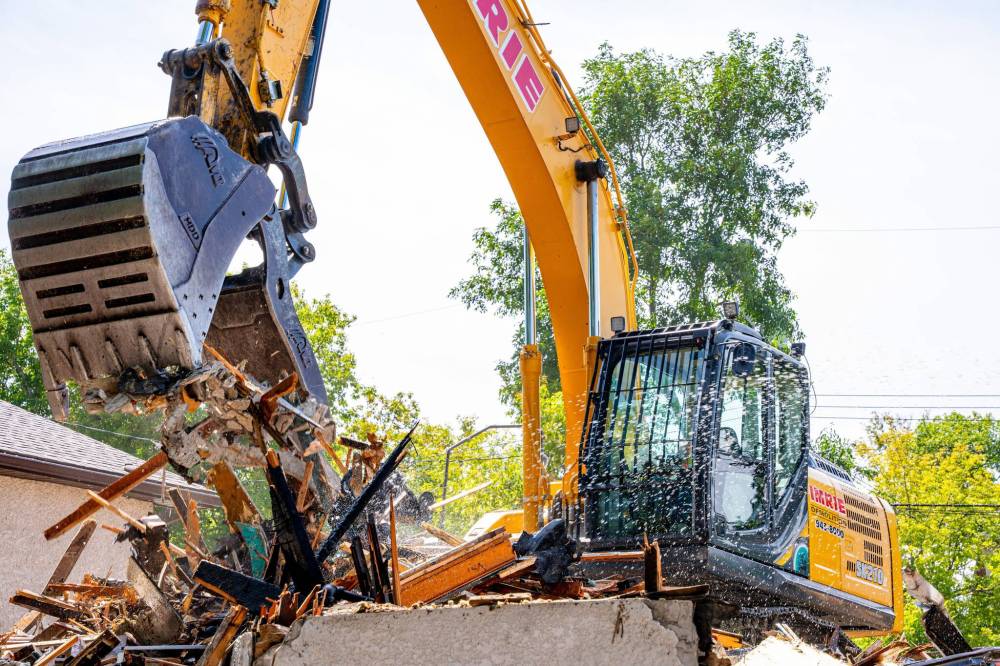A report headed to city council suggests it would be too costly for the City of Winnipeg to take over cleanup of demolition sites.
While residents and councillors have long called on the city to step in to remove rubble left behind for months or years after a building is demolished, the report suggests it would “not be economically feasible” to invest in the equipment and staff needed, because there’s only a short time period in the year when it can be done safely.
“The main delay in cleaning up these properties is the seasonality of the work.… The pre-qualification of several contractors means the city has ready access to many resources to conduct this work,” the report from the public service reads.

NIC ADAM / FREE PRESS FILES
A crew demolished a vacant house along Manitoba Avenue in late August after multiple fires at the property. A new report states it would be too expensive for the City of Winnipeg to cover the cost of cleaning up the rubble.
Properties with asbestos are required to be treated with “wet remediation” under the Workplace Safety and Health Act.
The process involves misting rubble with water to prevent airborne spreading of contamination, limiting work time from late spring to the end of fall.
There are 110 contractors in Winnipeg able to bid on demolition and remediation work.
The report suggests the average cost to do the work on a single-family home is $50,000 and for the city to meet demand, it would have to invest “hundreds of thousands” of dollars.
Currently, the owners of vacant buildings subject to demolition are responsible for cleaning up their property, but, if the owner does not comply, the city can take on demolition and remediation, adding the cost onto the owner’s property tax bill.
The city’s property and development committee will discuss the report Thursday.
Coun. Cindy Gilroy, who has long called on the city to find ways to expedite rubble cleanup, called the report “insufficient.”
“Quite frankly, this is mostly communities within the inner city, so it really makes it look like the city just doesn’t care about these communities,” said Gilroy (Daniel McIntyre).
Gilroy said she’d like to see a more detailed cost breakdown of methods the city could use.
“I think that there’s a mechanism that we could be doing and charging the homeowners for it,” she said.
“It might be that we pay for the cost up front through our tipping fees or whatever, but come up with some strategies and then let council decide on what they’d like to see. But that’s not what we’re seeing here, it’s just a no.”
She said she doesn’t plan to let the issue rest.
It’s not the first time a report has been commissioned on the issue at city hall: a similar report from September 2023 also suggested demolition cleanups could cost more than what the city would be able to recoup.
William Whyte Neighbourhood Association president Darrell Warren estimated there are more than three dozen rubble-filled lots in the area.
Warren said he’s been waiting six years for someone to clean up a pile of rubble that was once a home on Salter Street.
He’s looking to the province to provide the funds needed to clean up the lots.
“Hopefully they’ll make a commitment, money-wise,” he said.
Mayor Scott Gillingham reiterated the city’s position on the problem.
“This report confirms we have plenty of qualified demolition contractors available,” he said in a statement Friday.
“The real challenge is ensuring property owners take responsibility for their buildings. We also need the provincial government to work with us to identify safe, but faster ways to address properties containing asbestos.”
malak.abas@freepress.mb.ca

Malak Abas
Reporter
Malak Abas is a city reporter at the Free Press. Born and raised in Winnipeg’s North End, she led the campus paper at the University of Manitoba before joining the Free Press in 2020. Read more about Malak.
Every piece of reporting Malak produces is reviewed by an editing team before it is posted online or published in print — part of the Free Press‘s tradition, since 1872, of producing reliable independent journalism. Read more about Free Press’s history and mandate, and learn how our newsroom operates.
Our newsroom depends on a growing audience of readers to power our journalism. If you are not a paid reader, please consider becoming a subscriber.
Our newsroom depends on its audience of readers to power our journalism. Thank you for your support.